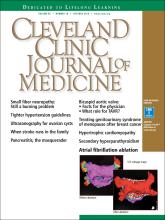Article Figures & Data
Tables
- TABLE 1
Systemic breast cancer treatments that cause genitourinary syndrome of menopause (GSM)
Treatments Breast cancer effects GSM effects Notes Endocrine therapy Aromatase inhibitors Effective in suppressing serum estrogen
Indicated for treatment of estrogen receptor-positive breast cancers in postmenopausal womenVaginal dryness, atrophic vaginitis Third-generation aromatase inhibitors—anastrozole, exemestane, and letrozole—have largely replaced tamoxifen as the preferred treatment for hormone receptor-positive breast cancer in postmenopausal women Tamoxifen Indicated for metastatic breast cancer, adjuvant treatment of breast cancer, and to reduce breast cancer incidence in women at high risk Vasomotor symptoms, vaginal dryness, and low libido Lower rates of vaginal dryness than with aromatase inhibitors; may actually inhibit or improve vaginal dryness induced by chemotherapy or menopause Chemotherapy Chemotherapy, biologic therapy, hormonal therapy Decrease levels of estrogen and progesterone, which improves clinical outcomes for breast cancer Vaginal dryness, atrophic vaginitis, other symptoms of estrogen loss Effective therapies but can induce symptoms of estrogen loss that negatively affect long-term vaginal health and quality of life; increase risk of ovarian failure in premenopausal women Based on information in reference 1.
- TABLE 2
FDA-approved labeling notes for treatments for genitourinary syndrome of menopause
Products GSM indications Breast cancer effects Estrogen products 17-beta estradiol vaginal cream (Estrace) Moderate to severe vulvar and vaginal atrophy due to menopause All estrogen products have the following labeling notes:
WHI: Estrogen alone was not associated with increased risk of breast cancer; estrogen plus progestin increased the risk
Contraindication: known, suspected, or history of breast cancer
Warning: Estrogens with or without progestins should be prescribed at the lowest effective doses and for the shortest durationConjugated estrogen vaginal cream (Premarina) Moderate to severe dyspareunia due to menopause
Atrophic vaginitis and kraurosis vulvae17-beta estradiol vaginal ring (Estring) Moderate to severe vulvar and vaginal atrophy due to menopause Estradiol hemihydrate vaginal tablets (Vagifem, Yuvafemb) Atrophic vaginitis due to menopause Estradiol vaginal inserts (Imvexxy) GSM, dyspareunia Combination estrogen product Conjugated estrogens/bazedoxifene (Duavee) Moderate to severe vasomotor symptoms associated with menopause Nonestrogen products Prasterone vaginal tablet (Intrarosa; contains dehydroepiandrosterone) Moderate to severe dyspareunia due to menopause Warning: Prasterone is contraindicated in women with known or suspected breast cancer; prasterone has not been studied in women with a history of breast cancer Ospemifene (Osphena) oral tablet Moderate to severe dyspareunia due to menopause Warning: Ospemifene has not been adequately studied in women with breast cancer; therefore, it should not be used in women with known or suspected breast cancer or with a history of breast cancer






